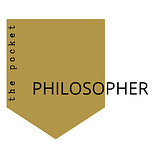Good morning everyone,
Welcome back to another week of timeless wisdom! I hope your weekend was restful and enjoyable.
This week we’re going to look at the theme of mindfulness from various perspectives—today beginning with Skepticism from Ancient Greece.
As we unpack this concept, one note out of the gate that I think is important to keep in mind. This word has many meanings throughout history, and I think it’s important we take time to respect that. In some traditions like Stoicism or even in modern psychotherapy, mindfullness is akin to a tool or secondary effect of cultivating healthy habits.
In other philosophies like Buddhism or among certain Yogic traditions, mindfullness is a difficult, nuanced, yet specific spiritual state. I think keeping that reality in mind will help us maintain collective humility and respect as we explore what people from around the world and history have to say about such a big topic.
Of course, as always, if you have something to clarify or add to any of this week’s posts, please comment at the bottom or reply to any email!
Thought
But if the same things appear different…we shall, indeed, be able to state our own impressions of the real object, but as to its essential nature we shall suspend judgement.
—Sextus Empiricus, Outlines of Pyrrhonism
We’ll dig a bit deeper in the background of Sextus Empiricus and and ancient Skeptics in just a moment, but a critical piece of information about him is that he was a physician. The above quote comes from his research into the anatomy of various kinds of animals compared to humans.
He is processing an interesting observation: that we are very similar to other animals in some respects, and very different in others. And Sextus concluded that where we are different we are incapable of truly knowing “what it is like” to be anything other than human.
We can all agree that to be a frog, or to be a cat, or dog is an experience we could conceptualize if we had a common language. Without it, however, we’re left to suspend judgement at the boundary of our knowledge and admit where we are lacking in genuine understanding. (This makes me think of our study on Ludwig Wittgenstein a few weeks ago.)
And it was in this simple reflection that Sextus Empiricus leaves behind that a fundamental theme of Skepticism is laid: the Suspense of Judgement.
And this Suspense of Judgement is at the core of mindfulness and its practice in almost every context we find it. Much of early Greek philosophy (think Stoicism for example) depends on the discernment between what we are capable of understanding and where we must admit a lack of knowledge or capacity.
The Suspense of Judgement allows us to turn off a mind of criticism and dualism and move into a space of accepting the way things are, especially if we cannot understand them.
As we will see this week, mindfulness is based on the ability to observe aspects of life we cannot fully understand without needing to judge them. It’s the ability to simply acknowledge that which we observe without attachments.
If we are able to apply the Suspense of Judgement even to the way we feel about our emotions, how we react to our thoughts, the way we engage events of life that are unpleasant, or how we choose to respond to a victory, we are moving into the seat of observer and a deeper place of awareness.
Because, as we’ve studied before, mindfulness is not about emotional detachment, it’s about cultivating the skills that enable us to observe, process, and accept life instead of resisting, fighting, and suffering over that which we cannot control.
The Suspending of Judgement, then, is both the foundation of deep wisdom and mindful awareness in our everyday lives.
Backstory
Sextus Empiricus probably lived in the 2nd or 3rd Century CE in Greece. He belonged to a school of philosophy known as Skepticism, and within that a sub-philosophy based on the work of a man named Pyrrho. The writings of Sextus Empiricus is a relatively rare, full-bodied collection of writings that has survived from the early Pyrrhonic Skeptics.
To be perfectly honest, I haven’t had the best relationship with Skepticism until recently. For many years, I concluded that this philosophy of life asked endless, circular questions in the name of knowing more, but never truly understanding.
And this is one of the great arguments laid against the Skeptics, especially the Pyrrhonics—that they believe nothing and the practice has little value.
However, in preparing this week’s letters, it is becoming increasingly clear that Skeptics are less interesting in understanding, and more interested in the tranquility that accompanies valuing multiple arguments with a suspense of judgement.
The core idea playing out here is that we as individuals can only hold our own perceptions, and wisdom increases when we listen to multiple arguments without attaching to one or the other. In many ways, this practice mirrors the Deep Listening we learned about from Thich Nhat Hanh last week.
And so this suspense of judgement was not just true in formal arguments but also in the practice of everyday life as we see above in quote.
Sextus is practicing his craft of research as he is a medical physician. Where others might jump to conclusions of various kinds, or perhaps confirmations of their biases, Sextus rather acknowledges his limitations, reports his observations, and suspends editorializing.
Perhaps this neutrality is not the best response to every situation, but I am coming to value it much more deeply that I could before. The courage to observe, deeply listen, and value the one making an argument or presenting an idea—even if it contradicts one’s own existing perspectives—makes room for wisdom, understanding, and coexistence.
And this observational approach to everyday life is at the core of mindful practices that enable us not to name or judge even our own experiences, but simply acknowledge our emotions as equally valid states of being.
And this produces a deep tranquility and peace both inside ourselves and outside amongst our community.
I hope this short reflection of Skepticism and Mindfulness was helpful, and I’m excited to continue to the conversation tomorrow.
Until then, please share, subscribe if you haven’t already to keep up with the conversation, and leave a comment!
Matt
References:
The Great Conversation, Norman Melchert, p 211
https://aeon.co/essays/mindfulness-is-loaded-with-troubling-metaphysical-assumptions
https://modernstoicism.com/features-the-philosophy-of-stoic-mindfulness-by-patrick-ussher/
https://plato.stanford.edu/entries/sextus-empiricus/















Share this post